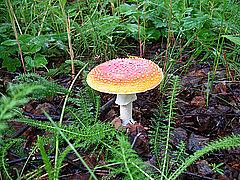If deadly mushrooms pop up, who's your go-to expert?

After a rain, mushrooms pop up. Even if you are an experienced mushroom hunter, it's hard to tell the difference between an edible variety and one that can be deadly.
The first time I reported on mushroom poisoning was in 2007. The emergency room doctor in Santa Cruz who treated a family of six who ate a meal made with deadly mushrooms picked in the wild treated the patients with intravenous silibinin, made from milk thistle and flown in from the German manufacturer, and five of the six survived.
The treatment is considered experimental. The North American Mycological Association reported in 2009 there is no proven antidote for amatoxin and in regions where good hospital care is not available, about 60% of the victims will die.
Now those odds are changing. The Santa Cruz physician, Dr. Todd Mitchell, got approval for a clinical trial based out of the local hospital, and this week, in the midst of overseeing treatment for four people recovering from mushroom poisoning, reported his results so far. Of 75 patients treated since 2007, he said, 66 made a rapid and complete recovery. Early treatment with aggressive hydration is key.
If you find yourself reporting on a case of mushroom poisoning, ask if the patients are enrolled in this clinical trial. Dr. Todd Mitchell at Dominican Hospital in Santa Cruz is the principal investigator. Here's the story.
[Photo by Luke Jones via Flickr]

